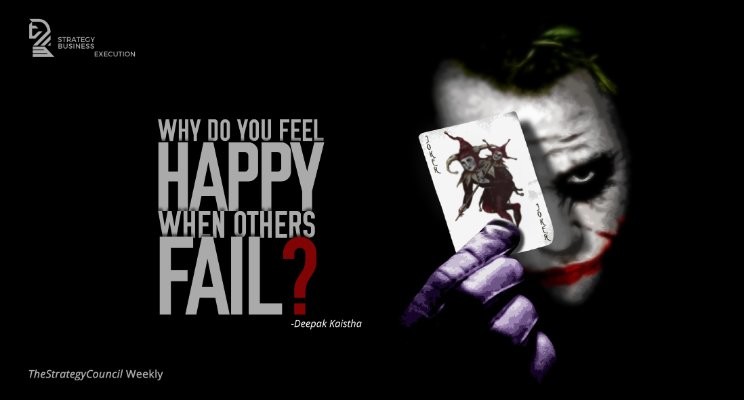
Why do you feel happy when others fail?
Have you ever sat across a colleague at a workplace who is discussing and enjoying someone's misfortune instead of empathizing? Well, this colleague of yours may be experiencing 'schadenfreude' (pronounced shaaden-froyda). It stems from the feeling when an individual gets a sense of satisfaction if misfortune befalls someone.
Wikipedia explains 'Schadenfreude' as "the experience of pleasure, joy, or self-satisfaction that comes from learning of or witnessing the troubles, failures, or humiliation of another."
Certainly, they feel an envious resentment of someone’s achievements deep inside their brain that constantly manifests in a negative behavior towards other people at a workplace, either in private or public.
In today's competitive organizational culture there is no escaping from office politics, back-biting, and annoying envious subordinates. In most companies, you will easily find group of people who are fundamentally pleasure-seeking creatures.
Observing the misfortune of their competitors brings a subsequent sense of satisfaction to this population. They are born with a tendency to dominate productive resources of the company in sheer frustration of not being able to achieve success for themselves.
Many kinds of research and studies revealed that schadenfreude stems from a deeper level primarily in terms of self-esteem, self-control, belongingness, and meaningful existence. Such individuals are by-and-large poor or underperformers’ yet highly competitive and it is this paradox that ignites an objectionable form of pleasure called schadenfreude.
It is well explained by psychologist Professor Richard H. Smith in his popular book 'The Joy of Pain’ that, comparisons with others and the conclusions we make about ourselves based on them, and the resulting emotions pervade most of our lives.
As much as inferiority makes us feel bad, superiority makes us feel good. The simple truth is that misfortunes happening to others are one path to the joys of superiority and help explain many instances of schadenfreude.
"Social comparisons are a way of life"
Generally, there are 3 major reasons why people feel pleased with the misfortune of another person:
(a) The other person is perceived to deserve the misfortune - This is purely an act of victim-blaming that occurs when a person is experiencing emotional outbursts and not able to accept his failures. As a defense mechanism, the protagonist feels pleasure-in-others'-misfortune with a strong belief the other person is destined to sufferings and his malicious joy is justified.
(b) They are passive in generating the other's misfortune - It has a lot to do with the theory of karma. According to a person who is experiencing schadenfreude, his rival sufferings are well deserved and the distress seems like moral causation to him.
(c) The personal comparative behavior syndrome – This happens with people constantly battling for attention. When the focus of attention shifts to someone else these people start feeling an overwhelming sense of jealously.
Organizations and employers of today must understand that employees are extremely sensitive stakeholders who are a collective reservoir of emotions and feelings. Therefore, investments should be made to address the issues and concerns of every employee at a primitive level, to create a positive working environment within the organization.
"Nothing is more important than empathy for another human being's suffering. Not a career. Not wealth. Not intelligence. Certainly not status. We have to feel for one another if we're going to survive with dignity" - Audrey Hepburn
